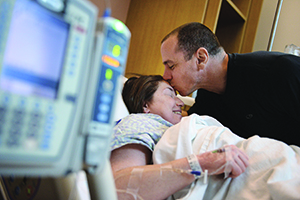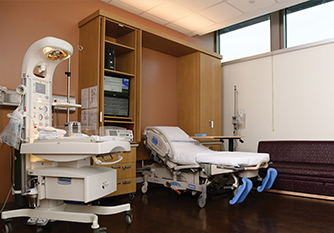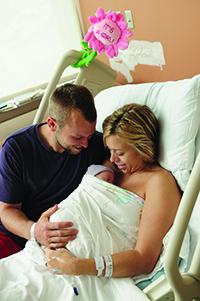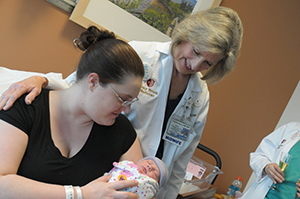In all aspects of mother-baby care, Stony Brook uses the latest, evidence-based protocols. For uncomplicated pregnancies, that means we allow a normal, healthy  physiological process to proceed as expected. In complicated pregnancies, we know when intervention is necessary. Our family-centered services and facilities are designed to create a private, comfortable, secure, nurturing environment precisely attuned to the mother’s and baby’s needs at every step of the journey to familyhood.
physiological process to proceed as expected. In complicated pregnancies, we know when intervention is necessary. Our family-centered services and facilities are designed to create a private, comfortable, secure, nurturing environment precisely attuned to the mother’s and baby’s needs at every step of the journey to familyhood.
Stony Brook has the expertise to handle every type of pregnancy and delivery, from routine to high risk. We have a team of board-certified obstetrician/gynecologists, along with a group of maternal fetal medicine specialists who specialize in high-risk pregnancies and deliveries. In fact, as an academic medical center, Stony Brook is the only hospital in Suffolk County to provide 24/7 access to maternal fetal medicine physicians as well as 24/7 availability of anesthesiologists who are dedicated to caring only for obstetrics patients. Whatever your pregnancy and delivery situation, all care is delivered in a soothing patient- and family-friendly environment.
 Facilities
Facilities
A Labor & Delivery Suite, with recovery rooms plus 10 private rooms with private bathrooms and a pullout couch to allow up to two adults to stay 24/7. The Suite is conveniently located near the newborn nursery and the neonatal intensive care unit (NICU) to provide new mothers and families a highly individualized birth experience that addresses their needs.
Individualized, Hands-On Care and Pioneering Programs
With a low nurse-to-patient ratio, which ensures hands-on care and ongoing patient education, we focus on delivering the kind of proactive care that prepares you and your family for the changes in their lives following the birth of your child. This includes:
 Pioneering practices that foster family bonding. This includes skin-to-skin contact. We promote skin-to-skin contact for both mother and father because of the proven benefits: It helps keep baby warm, regulates breathing, improves blood sugar, increases immunity, strengthens bonding, encourages breast feeding, and reduces postpartum depression. Stony Brook is an innovator in promoting skin-to-skin contact for all births and babies, including babies arriving prematurely or by C-section.
Pioneering practices that foster family bonding. This includes skin-to-skin contact. We promote skin-to-skin contact for both mother and father because of the proven benefits: It helps keep baby warm, regulates breathing, improves blood sugar, increases immunity, strengthens bonding, encourages breast feeding, and reduces postpartum depression. Stony Brook is an innovator in promoting skin-to-skin contact for all births and babies, including babies arriving prematurely or by C-section.
- Mother-Baby Rooming In. Keeping babies and mothers together postpartum – what we call “rooming in” – results in healthier babies and happier mothers. All 36 of the postpartum rooms in our Women & Infants Center are private, furnished and equipped for both baby and mother. Hotel-style features include in-suite bathrooms, free room service for two and free WI-FI. Mothers recuperate, bond with their newborns, and receive one-on-one education in breastfeeding and infant care in a comfortable, supportive environment, enjoying every one of their baby’s “firsts” – first examination, first bath, and so on – right there in their room. The newborn nursery is a step away when mothers need a break, along with a comfortable lounge for family.
- Gentler C-Sections. If a Cesarean section or other surgery becomes necessary, our three obstetric operating rooms are just steps away, with OB anesthesiologists available around the clock. Leaders in the movement toward patient-centered C-sections, some of our physicians are offering choices such as clear surgical drapes that let mothers see the baby being born, music of the family’s choice during surgery, and intraoperative skin-to-skin contact between mother and baby. We are pleased to have an 85 percent success rate for vaginal birth after C-section – and zero elective deliveries prior to 39 weeks.
- Successful breastfeeding. Not only do we have a full-time lactation consultant, but we also train all of our mother-baby nurses in breastfeeding support and advocacy. It works: our percentage of mothers exclusively breastfeeding has risen by 40 percent in the last five years. In addition, we are part of the New York State initiative to promote breastfeeding.
- Access to support staff. This includes chaplains, psych nurses and social workers who can work with patients in crisis or connect them with appropriate resources upon discharge.
- A variety of patient education classes and support groups. This includes prenatal care, newborn care, breastfeeding and sibling education.
- A Word About Safety. It’s a priority. We use high-tech security equipment and safety measures to ensure only approved visitors have access to your baby.
The Midwife Option
Stony Brook Medicine is home to the largest midwifery practice in the area — led by faculty members of the Department of Obstetrics/Gynecology. Eighteen certified nurse-midwives and certified midwives are on staff to provide care for women with uncomplicated pregnancies. Their approach is low-tech, holistic and supportive of your informed choices. Options may include: wearing your own clothing instead of hospital gown; laboring and giving birth in any position including labor in the shower; and having light food and fluids while there is normal labor progression. IVs and continuous monitoring are not routine in our midwifery practice and can be avoided if desired, unless medically necessary.
pregnancies. Their approach is low-tech, holistic and supportive of your informed choices. Options may include: wearing your own clothing instead of hospital gown; laboring and giving birth in any position including labor in the shower; and having light food and fluids while there is normal labor progression. IVs and continuous monitoring are not routine in our midwifery practice and can be avoided if desired, unless medically necessary.
Learn more about the midwifery practice at Stony Brook Medicine.
Take a Tour
Take a virtual tour of the maternity services offered at Stony Brook University Hospital — Suffolk County’s only Regional Perinatal Center — and learn what it’s like to give birth at Stony Brook.
High-Risk Pregnancy
Stony Brook Medicine was designated by New York State as a regional perinatal center, what is known as a referral center for all high-risk pregnancies and deliveries in Suffolk County. This means that women who have known risks — advanced age, pre-existing conditions or acquired risks such as pre-eclampsia or gestational diabetes — will be referred to Stony Brook by their doctors for management of their pregnancy.
This can range from ongoing monitoring and specialized testing to 24/7 bedrest, surgical cerclage or — if a problem is identified with the fetus — in-utero surgery. In addition, if a woman has another health problem not associated with the pregnancy but could be affected by the stress of childbirth — for example a heart condition or autoimmune disorder — Stony Brook can put a multidisciplinary care team of experts in place for the birth, who are prepared for potential complications unique to her condition.
Also, women who experience complications or premature deliveries at local community hospitals will be transferred to Stony Brook Medicine so they can receive appropriate, advanced care. Our transport service is staffed by obstetric experts to ensure the safety of mother and baby en route.
The doctors who treat high-risk pregnancies are known as maternal fetal medicine physicians. At Stony Brook, these are board-certified obstetric-gynecologists who have completed a fellowship in maternal-fetal medicine. Leading our division is nationally recognized David J. Garry, DO for his expertise in maternal fetal medicine.
The department is also committed to preventing premature births and can help women assess their risks before pregnancy, guide the decision-making process, and connect them with genetic counselors and other experts as needed.
Physicians and staff:
Cecilia Avila, MD, MPH
David Baker, MD
James Bernasko, MD
David Garry, DO
Cassandra Heiselman, DO, MPH
Kimberly Herrera, MD
Ayesha Hussain, DO
Gina Milone, MD
Brittany Roser, MD
Kristen Alarcon, NP
Nancy Bowden, NP
Five Simple Things You Can Do to Have a Healthier Pregnancy
- Take folic acid — 400 to 800 micrograms a day.
- Drink extra fluids, especially water.
- Wash hands, especially after handling raw meat or using the bathroom.
- Always wear a seat belt.
- Get a flu shot.

